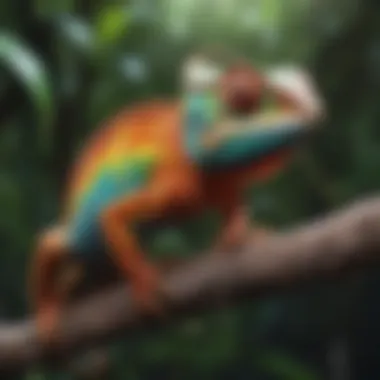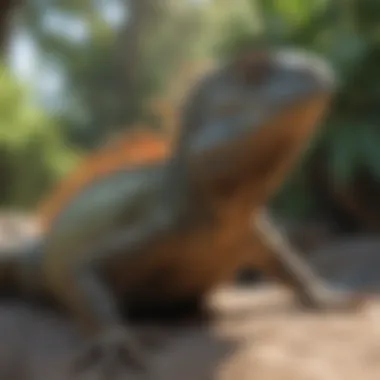Navigating the Realm of Exotic Pets: A Comprehensive Guide


Intro
Owning exotic pets presents a high level of responsibility and informed decision-making. As interest in these unique animals grows, prospective owners must navigate a series of complex considerations. While the allure of such pets may be strong, it is essential to understand the intricate needs related to their care, behavior, and habitat. The following sections aim to provide a comprehensive guide through the realms of exotic pet ownership, focusing on key areas necessary for fostering a safe and nurturing environment.
Care Tips
Caring for an exotic pet requires daily attention and specialized knowledge. Establishing a consistent care routine is crucial. This includes not just feeding, but also ensuring they are mentally stimulated and physically active.
Daily Care Routines
Daily routines for exotic pets often include feeding, cleaning, and social interaction. Regularly scheduled feeding times help to maintain a structured environment. Many species thrive on a routine and rely on their owners for companionship.
Cage Setup and Maintenance
Proper setup of the cage is important for the safety and well-being of the pet. Depending on species, the dimensions may vary significantly. For example, larger birds require spacious cages with various perches, toys, and safe spaces for hiding. Maintenance includes regular checks for wear and tear, ensuring that all elements are safe and secure.
Hygiene and Cleaning Practices
Hygiene is a non-negotiable aspect of pet ownership. Regular cleaning prevents the build-up of harmful bacteria and parasites. A schedule for cleaning the cage, food and water containers, and toys should be established.
Seasonal Care Adjustments
The care of exotic pets can also change with the seasons. For instance, certain birds may need extra warmth during colder months. Owners should adapt care routines to reflect seasonal changes, ensuring comfort and well-being.
Behavioral Insights
Understanding the behaviors of exotic pets is vital to fostering a strong bond and addressing potential issues.
Understanding Bird Body Language
Birds communicate largely through body language. Recognizing signs of happiness or distress can greatly improve the relationship between owner and pet.
Common Behavioral Issues and Solutions
Some common issues include screaming, feather plucking, and aggression. Identifying these behaviors early on and consulting with experts can alter unwanted patterns.
Positive Reinforcement Techniques
Using rewards to encourage desired behaviors is effective. Positive reinforcement not only helps in training but also builds trust. Treats, praise, or additional playtime can serve as incentives.
Social Interaction Needs
Many exotic birds are social creatures that require interaction. Regular socialization can help mitigate issues like loneliness or aggression.
Nutrition Guides
Feeding exotic pets appropriately is a cornerstone of responsible ownership.
Essential Diet Components
An optimal diet should consist of a mixed variety of foods tailored to the species. These often include seeds, fruits, nuts, and specially formulated pellets.
Safe and Toxic Foods
Knowledge about unsafe foods is critical. Foods that are toxic include chocolate, avocado, and caffeine. Always consult reliable sources when unsure of a food's safety.
Supplements and Treats
Certain species may benefit from supplements to ensure balanced nutrition. Likewise, healthy treats can offer enjoyment and variety in their diet.
Feeding Strategies for Different Species
Each species may have particular feeding habits. Owners must learn about the individual needs to ensure appropriate intake and prevent health issues.
Wellness and Health
Maintaining the health of an exotic pet is an ongoing process.
Routine Health Checkups
Regular veterinary visits are important to catch health issues early. Specific vaccinations and check-ups should be prioritized based on the species.
Identifying Symptoms of Illness
Recognizing early signs of illness can save lives. Changes in appetite, behavior, or droppings might indicate issues requiring immediate attention.
Preventative Care and Vaccinations
Preventative care includes vaccinations and routine check-ups. Work closely with a veterinarian familiar with exotic species for tailored guidance.
Mental and Emotional Well-being
Mental well-being is as vital as physical health for exotic pets. Providing enrichment, social interaction, and out-of-cage time encourages positive mental states.
Enriching Activities
Engaging pets in enrichment activities enhances their lives.
Toys and Playtime Ideas
Offer a variety of safe toys that encourage play and exploration. Rotate toys regularly to maintain interest and challenge mental stimulation.
Training and Tricks
Teaching tricks is more than just entertainment. It serves as mental stimulation and enhances bonding. Begin with simple commands and gradually increase difficulty.
Outdoor Activities and Interaction
Supervised outdoor time can provide great sensory experiences. It allows pets to explore new environments safely.
DIY Projects for Mental Stimulation


Creating DIY toys and puzzles can be fulfilling. These projects can engage their minds and provide a creative outlet for owners.
By understanding the nuances of exotic pet ownership, prospective owners can make informed decisions, ensuring a rewarding and responsible experience.
Understanding Exotic Pets
In an era where pet ownership goes beyond traditional choices, understanding exotic pets has become increasingly relevant. Exotic pets can offer unique companionship and require a distinct set of care methods. Grasping the fundamental concepts of owning these animals can significantly impact the welfare of both the pet and the owner. Such understanding includes the knowledge of specific needs, behavior, and health issues related to exotic pets, ultimately shaping a positive ownership experience.
Definition and Classifications
Exotic pets are often defined as animals not commonly kept as pets. This can include a wide variety of species, from reptiles such as iguanas and snakes to birds like parrots, and even small mammals like ferrets or sugar gliders. The classification of exotic pets varies by region and legal standards, as some animals are deemed exotic based on local regulations.
Here are some broad categories:
- Reptiles: This includes snakes, lizards, and turtles.
- Birds: Common exotic birds include cockatoos, macaws, and finches.
- Mammals: Less common pet mammals encompass hedgehogs, skunks, and capybaras.
- Aquatic Animals: Exotic fish, such as bettas, and other underwater creatures fall into this category.
Understanding these classifications helps in assessing their care requirements, habitat setups, and potential legalities involved in pet ownership.
Common Misconceptions
There are numerous misconceptions surrounding exotic pets that can lead to detrimental outcomes for both the animal and the owner. One prevalent belief is that these pets are easier to care for than traditional pets. In reality, many exotic pets have highly specialized needs that include specific dietary requirements, proper environmental conditions, and socialization needs.
Additionally, potential owners may think that exotic animals do not form attachments or have complex behaviors. However, many species exhibit a range of emotions and social behaviors that require understanding and nurturing.
"Exotic pets require just as much dedication and emotional awareness as cats or dogs. Many owners are unprepared for this reality."
Cautious assessment and education can help dispel these myths. Ensuring that prospective owners have accurate information before acquiring an exotic pet is crucial. By fostering a well-informed community, the wellbeing of exotic pets can significantly improve, leading to safer and more responsible ownership.
The Landscape of Exotic Pet Ownership
Understanding the landscape of exotic pet ownership is crucial for potential owners. This section outlines the specific elements that define this realm, offers benefits associated with responsibly owning exotic animals, and sheds light on considerations that must be accounted for.
Regulatory Aspects
Regulatory aspects of exotic pet ownership vary significantly between regions and countries. Laws are often in place to protect both the animals and the environment. Prospective owners should familiarize themselves with the local regulations about which species are permissible to own. Many places have bans on certain reptiles or large mammals to prevent ecological disruption or ensure public safety.
Before acquiring an exotic pet, one should consider:
- Permits Required: In some jurisdictions, a special permit is necessary for ownership of specific species. Not having one can lead to legal repercussions.
- Species Protection Laws: Some animals are protected under international laws, such as the Convention on International Trade in Endangered Species (CITES). It is important to verify whether such regulations apply to the species you are interested in.
- Local Ordinances: Each city or state may have its own rules. Checking local ordinances can prevent unwanted surprises after bringing a pet home.
Failing to adhere to these regulations can result in confiscation of the animal, fines, or other penalties. Therefore, understanding the legal implications of owning exotic pets is paramount.
Ethical Considerations
Ethical considerations involve the responsibility of pet owners to ensure their exotic pets live in environments that meet their needs. Animals taken from their natural habitat are often subjected to stress and behavioral issues in captivity. Thus, ethical owners take the time to understand the specific needs of their exotic pet, including habitat, social requirements, and enrichment activities.
Important ethical obligations include:
- Species-Specific Needs: Different species have unique requirements. For example, a parrot needs social interaction, while reptiles require specific temperature gradients in their habitat.
- Rescue and Adoption: Many exotic animals in captivity need homes due to neglect or abandonment. Choosing to adopt can be both ethical and rewarding.
- Education and Advocacy: Owners are often responsible for educating themselves about their pets and advocating for better treatment of exotic animals within the pet trade.
By taking these ethical considerations into account, owners not only enhance their pets' lives but also contribute positively to the broader discourse on animal welfare.
Environmental Impact
The environmental impact of owning exotic pets cannot be ignored. The trade and ownership of exotic animals can have significant consequences on biodiversity and ecosystem stability. Understanding these impacts is critical for responsible ownership.
Aspects to evaluate include:
- Invasive Species: Some exotic pets, when released into the wild, can become invasive. This disrupts local ecosystems and harms native species.
- Sustainability of Trade: The exotic pet trade can lead to overharvesting of species in the wild, further threatening their survival. Supporting sustainable and ethical sources is essential.
- Conservation Efforts: Responsible ownership can support conservation by fostering awareness and contributing to efforts aimed at protecting endangered species.
"Exotic pets can be both a joy and a responsibility; however, their ownership extends beyond personal enjoyment to include ecological and ethical implications."
In summary, the landscape of exotic pet ownership encompasses various regulatory, ethical, and environmental factors. Prospective owners must navigate these carefully to foster a holistic approach to care and stewardship.
Varieties of Exotic Pets
Understanding the types of exotic pets available is crucial for prospective owners. Each variety comes with its own set of requirements and characteristics that dictate how they should be cared for. The knowledge about these varieties assists in making informed decisions that align with both the owner's lifestyle and the pet's needs. The appreciation of diversity in exotic pets requires careful consideration of their habitats, diets, and behavior.
Reptiles
Popular Species
Reptiles are often chosen for their unique allure. Common species include the ball python, the leopard gecko, and the bearded dragon. Each of these reptiles presents specific benefits. For instance, ball pythons are known for their docile nature. They adapt well to captivity and thrive with proper care. This adaptability makes them a favored option for many exotic pet enthusiasts.
The unique feature of these reptiles is their low-maintenance care compared to some other exotic pets. However, they do require specific temperature and humidity levels in their enclosures, which can be a challenge for new pet owners.
Care Requirements
Caring for reptiles involves meticulous attention to their habitat. This is not merely about providing food. Temperature regulation, humidity control, and habitat enrichment are key components of reptile care. For example, most reptiles require a basking light to regulate their body temperature. This characteristic makes this step essential for maintaining their health.
The advantage of comprehensive care requirements lies in the longer lifespan of these pets if maintained correctly. Yet, this level of care can be seen as overwhelming by new owners, emphasizing the need for proper education prior to acquisition.
Behavioral Traits
Reptiles exhibit distinct behavioral traits that influence their interaction with owners. Many are solitary animals and can display stress if handled too frequently. Understanding these characteristics is vital. Many owners appreciate the low interaction levels of reptiles, as it allows a more hands-off approach to pet care. However, this might lead to misconceptions about the potential for bonding.
Birds
Species Overview
Birds, such as parrots, cockatiels, and finches, present a vibrant addition to any home. This variety not only brings aesthetic pleasure but also engages owners in more interactive ways. Parrots are particularly known for their intelligence and ability to mimic sounds, which can foster a unique bond between bird and owner.
The colorful plumage of these species enhances their appeal, alongside their playful behaviors. However, they require extensive social interaction. Understanding these needs helps in ensuring a suitable living environment.
Nutritional Needs
Nutritional care is critical to the wellbeing of birds. A balanced diet consisting of pellets, seeds, and fresh fruits is vital. For instance, specific species like African greys need higher calcium intake. This characteristic reinforces the importance of species-specific diets for optimal health.
Failure to meet their dietary needs can result in serious health issues. Hence, educating oneself on these requirements is beneficial not only for the bird but for a harmonious owner-pet relationship.
Socialization


Socialization is another essential aspect. Most birds thrive on interaction not just with humans but also with their own kind. They are social creatures and need companionship. This highlights a critical decision-making factor for prospective owners.
The interactive nature of birds can make them rewarding companions, but they can also develop behavioral problems if not properly socialized. Understanding this dynamic is crucial in fostering a healthy environment.
Mammals
Uncommon Choices
Mammals such as sugar gliders, hedgehogs, and Fennec foxes are gaining attention in exotic pet ownership. These uncommon choices bring a unique charm and experience. For example, sugar gliders bond closely with their owners, which many find appealing.
However, their needs for social interaction and specific living conditions can be demanding. The distinct characteristics of these mammals should lead owners to consider whether they can meet these needs adequately.
Living Conditions
Mammals usually require elaborate living conditions. This aspect is critical as inadequate habitats can lead to stress and health issues. Species like hedgehogs require a clean environment with ample enrichment. This trait highlights the necessity to invest time in habitat setup and maintenance.
Moreover, understanding the spatial needs of these mammals can prevent behavioral issues. Thus, careful planning is critical for enjoyable pet ownership.
Handling and Interaction
The handling and interaction with mammals are varied based on species. Animals like the Fennec fox may require gentle and patient handling due to their skittish nature. Conversely, sugar gliders can enjoy active handling if properly socialized.
Understanding each species’ handling needs helps avoid potential stressors during interaction, contributing to a more enjoyable experience for both the pet and owner.
Aquatic Animals
Care for Exotic Fish
Caring for exotic fish entails unique requirements. Freshwater species like bettas or saltwater species like clownfish require dedicated setups. Their health relies heavily on water quality, temperature, and compatible tank mates. The attention needed for these factors means commitment from owners.
Each type of fish showcases distinct behaviors, such as territorial or schooling tendencies. Understanding these traits contributes to successful cohabitation and showcases the captivating nature of these aquatic pets.
Aquarium Setup
Setting up an aquarium demands careful consideration of various elements. Filtration, aeration, and substrate are just a few components that are crucial to maintaining ecosystem balance. An aquarium setup that lacks these elements can lead to unhealthy living conditions.
Additionally, the setup needs to reflect the natural habitat of the species chosen. This factor enhances the fish's natural behaviors. Thus, ensuring adequate knowledge before diving into this hobby is essential.
Feeding Recommendations
Feeding exotic fish is pivotal. Different species have specific dietary requirements, such as flake foods or freeze-dried options. Poor feeding practices lead to nutrient deficiencies, impacting their health.
Educating oneself about species-specific feeding recommendations helps owners maintain healthy fish. It prevents common mistakes that can hinder their aquatic pets' wellbeing.
Healthcare for Exotic Pets
Healthcare is a crucial pillar of responsible exotic pet ownership. Unlike dogs and cats, exotic pets have unique needs that often require specialized care. It is essential for owners to be well-informed about the specific health concerns relevant to the species they are keeping. Failure to address these needs can lead to serious health problems, and potentially shorten the lifespan of these animals. Moreover, understanding components such as nutrition, veterinary care, and preventive measures enhances quality of life for these pets. In this section, we delve into the various aspects of healthcare that every owner should prioritize.
Veterinary Care
Finding a Specialist
Finding an exotic animal veterinarian is vital for the health of your animal. Most conventional vets lack experience with exotic species. A specialist understands the nuances of various exotic animals, which can lead to more accurate diagnoses and effective treatments. Key characteristics of finding a good specialist include their training and experience with exotic pets. This detailed knowledge can prevent minor issues from escalating into serious health crises. The unique feature of consulting a specialist is the peace of mind it provides to owners knowing their pet is receiving expert care. However, healthcare costs may be higher, presenting a disadvantage for some owners.
Preventative Health Measures
Preventative health measures are essential in maintaining your exotic pet's health. This encompasses routine check-ups, vaccinations, and regular screenings for common diseases. By adopting a preventive approach, owners can avoid a myriad of health challenges and ensure their pet remains in optimal condition. A key characteristic of these measures is their ability to identify health issues before they become critical. The unique aspect here is the investment in early detection, which can often save money in the long run. However, the downside is that preventative care can sometimes be overlooked due to perceived higher costs.
Common Illnesses
Understanding common illnesses prevalent in exotic pets is important for timely intervention. Illnesses may vary significantly between species, so it is crucial for owners to be aware of the signs specific to their pets. For instance, reptiles may suffer from respiratory infections, while birds typically face issues like psittacosis. Recognizing the key characteristics of these illnesses allows for quick action to be taken. Familiarity with symptoms helps the owner to address issues immediately, providing a better outcome. However, misdiagnosis or neglecting to consult a veterinarian can lead to serious repercussions for the pet's health.
Nutrition and Diet
Formulating Balanced Diets
Formulating balanced diets for exotic pets is essential for their growth and well-being. The specific dietary needs depend on the type of pet, and an unbalanced diet can lead to health complications. A balanced diet contributes to better immunity and reduces the risk of obesity and nutritional deficiencies. Owners should research their pet's species to understand the best dietary practices. A unique feature of balanced diets is that they can be tailored to include fresh fruits, vegetables, or specialized pellets, depending on the species. However, creating balanced diets can be complex and may require guidance from a nutrition specialist.
Supplements and Vitamins
Some exotic pets may need dietary supplements and vitamins to ensure optimal health. Factors like age, breed, and health status play a role in determining the specific needs of each animal. The key characteristic of using supplements is that they can help fill nutritional gaps in the pet’s diet. This is especially true for species that may require certain nutrients that are not available in their regular food. However, overuse of supplements may lead to toxicity, so it is important to follow specialist recommendations.
Species-Specific Requirements
Each exotic species has its own dietary requirements that need to be closely followed. Properly understanding these needs ensures that owners are not only meeting the basic nutritional needs of their pets but also their unique preferences. Species-specific requirements can encompass everything from the types of foods provided to how they are prepared. For example, some reptiles thrive on a diet heavy in insects, while others may require a plant-based diet. The upside is that meeting these requirements can significantly improve health and longevity. However, learning about these specific needs can be time-consuming and sometimes overwhelming for new owners.
Proper healthcare for exotic pets is not just about treating illnesses; it is about creating a foundation for a healthy life.
Training and Enrichment
Training and enrichment are essential components in the care of exotic pets. They ensure that these animals are not only well-behaved but also mentally stimulated and physically active. This section provides insight into training techniques and enrichment activities that can enhance the quality of life for exotic pets. Effective training and enrichment contribute to a more harmonious relationship between pet and owner, reducing the likelihood of behavioral issues while promoting wellbeing.
Training Techniques
Basic Commands
Basic commands serve as the foundation for establishing communication between an owner and their exotic pet. Commands such as "sit" or "come" help pets understand expectations and rules within their environment. The key characteristic of basic commands is their simplicity, making them accessible for both the animal and the owner. This technique is beneficial because it fosters a sense of security and structure. Learning basic commands can improve the bond, as the pet begins to trust the owner’s guidance. However, some pets may struggle with these commands initially, requiring patience and consistency.
Behavior Modification
Behavior modification focuses on altering undesirable actions through specific techniques, such as positive reinforcement. It involves understanding the underlying reasons for a pet's behavior, whether it be stress or boredom. The critical aspect of behavior modification is its adaptability; it can be tailored to fit the unique needs of various species and individual pets. This makes it a popular choice among exotic pet owners, as it allows for a more personalized approach. The unique feature is its potential to significantly enhance the pet's overall demeanor, though it may take time to see results.
Socialization Exercises
Socialization exercises are crucial for developing a well-adjusted exotic pet. These exercises encourage interaction with both humans and other animals, helping the pet to feel more comfortable in diverse environments. The key attribute of socialization is its ability to reduce anxiety and fear, making pets more confident. This method is favored by many owners because it lays the foundation for a stable temperament. On the downside, introducing pets to new situations must be done gradually, as rushing can lead to stress or aggression.
Enrichment Activities
Physical Enrichment
Physical enrichment involves providing environments that stimulate movement and exploration. This can include climbing structures for reptiles or varied perches for birds. The major benefit is that it promotes natural behaviors, keeping the pets physically active and engaged. Physical enrichment is a crucial aspect since many exotic pets may face health issues related to inactivity. The downside might be the need for space and resources, which some owners may find challenging to provide.


Mental Challenges
Mental challenges are designed to engage a pet's cognitive abilities. This can involve puzzles or hidden food toys, stimulating problem-solving skills. The primary advantage is that it keeps pets entertained and reduces boredom, leading to an overall happier pet. Many owners find this method appealing; it fosters a bond through shared activities. However, care must be taken to avoid frustration for the pet, as complex challenges may not yield positive results if not appropriately matched to their skill level.
Interactive Play
Interactive play focuses on engaging the pet in activities that involve direct interaction with the owner. This could be through games or targeted exercises using toys. The key feature of interactive play is its ability to strengthen bonds, providing both mental and physical stimulation. It’s recognizable as a beneficial form of enrichment, as it encourages pets to express natural behaviors. A potential downside could be the time commitment required from the owner, which may not always align with busy lifestyles.
Enrichment is not just an option; it is a necessity for the overall health and happiness of exotic pets.
Creating the Ideal Environment
Creating a suitable environment for exotic pets is crucial for their well-being and overall health. Each species has specific habitat needs that must be met to ensure they thrive. Failure to address these requirements can result in stress, illness, or even death. Potential owners must understand these factors before bringing an exotic pet into their home.
Habitat Design
Terrarium or Aquarium Setup
Setting up a terrarium or aquarium is a fundamental aspect of a successful exotic pet habitat. The choice between the two largely depends on the type of pet being housed. Terrariums are often used for reptiles, while aquariums are suited for aquatic life. A well-designed terrarium can mimic the natural habitat of reptiles, providing hiding spots and climbing structures. Similarly, an aquarium offers an aquatic ecosystem that supports fish and other marine animals. Both options foster an environment that encourages natural behaviors.
However, each setup has unique challenges. For example, maintaining water quality in an aquarium requires ongoing attention, while a terrarium may need regular humidity adjustments. Proper setup is essential to avoid these pitfalls, ensuring a healthy living space.
Temperature and Humidity Levels
Temperature and humidity are critical factors in the comfort of exotic pets. Different species have specific requirements; for example, tropical reptiles and amphibians need warm, humid conditions, while desert-dwelling animals thrive in dry, hot environments. Correct temperature regulation can influence metabolism and activity levels in these animals. High humidity levels are often necessary for hydration and proper skin shedding, particularly in reptiles.
Failure to maintain appropriate levels can lead to serious health issues, including dehydration or thermal stress. For owners, investing in reliable thermostats and hygrometers is essential for monitoring these conditions accurately.
Enclosure Safety
Safety in the enclosure cannot be overlooked. Exotic pets have different needs for space, security, and materials that can prevent escapes and injuries. A well-secured enclosure protects pets from both external dangers and their possibility to escape. For instance, glass or metal cages can be secure options that provide visibility while ensuring safety.
Properly designed enclosures will include secure locks, escape-proof designs, and non-toxic materials. Owners must often evaluate the structure and security of their setup regularly, ensuring the environment remains safe for their exotic companions.
Socialization Spaces
Same-Species Interaction
Allowing same-species interaction is vital for social animals. Groups of similar species can engage in natural behaviors, which contributes significantly to emotional health and well-being. For instance, many bird species flourish in social settings where they can communicate and interact. This type of environment can reduce stress and promote confident behaviors.
However, it is critical to ensure the space is large enough to minimize aggression and allow for individual territories. Without adequate space for each pet, territorial disputes may arise, which could lead to injuries.
Play Areas
Designating play areas enhances the environment for exotic pets. These spaces can include toys, climbing structures, and objects that encourage physical activity and mental stimulation. For example, birds benefit greatly from exercise platforms, while certain mammals require climbing structures or tunnels for enrichment.
By providing dedicated play spaces, owners can help their pets stay active and engaged, which contributes to overall physical health and avoids sedentary behaviors that may lead to obesity.
Quiet Zones
Finally, incorporating quiet zones in the environment helps reduce stress for animals. These areas can be designed with soft bedding, hiding spots, or low-traffic zones where pets can retreat from overwhelming stimuli. Many exotic pets can be sensitive to noise and movement. So offering a designated quiet space allows them to escape from distractions and promote relaxation.
In summary, addressing the needs outlined in this section helps create a nurturing environment for exotic pets. Owners must consider habitat design, social opportunities, and comfort factors. This comprehensive approach is essential for the health and happiness of exotic animals.
Prospective Challenges
Understanding the prospective challenges of owning exotic pets is crucial for anyone considering such a commitment. Many individuals romanticize the idea of caring for these unique animals, but it is essential to confront the reality of associated challenges. These not only involve practical care needs but also behavioral management and legal responsibilities. Awareness of these challenges leads to informed decision-making and better outcomes for pets and owners alike.
Behavioral Issues
Behavioral issues can manifest in various forms when an exotic pet feels threatened or stressed. Identifying and addressing these behaviors is critical for creating a safe environment.
Aggression
Aggression often surfaces as a defensive mechanism in exotic pets. This behavior can be traced back to their natural instincts and territoriality. Understanding the triggers of aggression is vital, as it can significantly influence the harmony in a household with other pets or human members.
When an exotic pet displays aggressive behavior, like biting or lunging, it can be alarming. This intensity often stems from a need for self-protection or habitat security, making it an essential aspect to consider. By recognizing this, owners can take proactive measures, such as training or environmental adjustments, to mitigate risks. However, the aggressive display can deter some prospective owners, limiting their options and leading to hasty decisions.
Stress Indicators
Stress indicators are behaviors that signal an animal's discomfort or health issues. Observing these signs ensures timely interventions. Common stress indicators in exotic pets include excessive hiding, rapid breathing, or changes in feeding habits. Recognizing these signs is beneficial, as it allows owners to adjust conditions accordingly, enhancing the pet’s quality of life. For instance, if a pet shows signs of stress after exposure to loud noises, creating a serene environment may alleviate its discomfort.
The unique feature of stress indicators lies in their varying manifestations across species. For bird owners, these might present as feather plucking or screaming, while reptiles may exhibit lethargy. Understanding these specific behaviors provides significant advantages; it helps avoid misinterpretations that can lead to unnecessary stress for both pet and owner.
Excessive Vocalization
Excessive vocalization in exotic pets may emerge from various causes, including stress, loneliness, or an unmet need. For bird owners, this is a common concern. Parrots, for instance, can be quite loud. Identifying the reason behind the vocalization is crucial. If a bird screams for attention, it suggests a need for social interaction. In such cases, strategizing socialization schedules can mitigate vocal outbursts while also enriching the pet's life.
Excessive vocalization can negatively impact living environments, especially in shared spaces. Potential owners must consider this aspect when choosing certain species. Owners can manage it effectively through behavioral training techniques and regular interactions, ensuring a more tranquil home.
Legal Restrictions
Legal restrictions can pose significant challenges to prospective exotic pet owners. Each locality may impose unique regulations governing the ownership of exotic species, aimed at ensuring safety for both the public and the animals themselves. These laws can dictate which animals are permissible, care standards, and even require permits or licenses. Failure to adhere can lead to fines or confiscation of animals, underscoring the importance of research before acquiring an exotic pet.
In many cases, legal restrictions also serve a larger ethical purpose, aimed at preventing wildlife trafficking and conserving native species. Owners must remain informed about local and federal laws regarding the care and ownership of exotic pets, as ignorance may result in severe consequences. Thus, combining knowledge of prospective challenges with legal considerations ultimately leads to a more responsible and enriching experience for both pets and owners.
Future Trends in Exotic Pet Ownership
Understanding the future trends in exotic pet ownership is crucial for current and prospective owners. The landscape of exotic pet ownership is always evolving due to various factors such as consumer preferences, regulations, and environmental considerations. This section sheds light on these trends, emphasizing their significance in ensuring responsible ownership and sustainability.
Shifts in Consumer Interest
The interest in owning exotic pets has undergone notable shifts in recent years. More people are now seeking companions that differ from traditional pets like dogs and cats. This desire for uniqueness drives demand for less common species. Factors contributing to this shift include:
- Social Media Influence: Instagram and TikTok have popularized various exotic pets, making them desirable. Pet enthusiasts showcase their unique pets, sparking interest among viewers.
- Increased Information Access: There are more resources available about caring for exotic pets than ever before. Online forums such as Reddit enable pet owners to share experiences and knowledge effectively.
- Desire for Connection: In a fast-paced world, many seek meaningful connections with animals that offer different interactions than conventional pets. This leads to exploring unique species that may require specialized care.
These shifts invite consumers to be more selective and informed in their choices, which can ultimately lead to greater accountability among owners. Ethical considerations become paramount as more exotic species enter household environments.
Impact of Conservation Efforts
Conservation efforts are shaping future trends in exotic pet ownership. Public awareness regarding the protection of wildlife has risen dramatically. As a result, several critical forces are in play:
- Responsible Sourcing: Increasingly, buyers are holding sellers accountable for the ethical sourcing of exotic pets. More consumers are asking questions about where their pets come from and whether they have been sustainably acquired.
- Bans and Restrictions: Governments are implementing stricter regulations surrounding the ownership of certain species in an effort to protect endangered wildlife. This influences consumer decisions and encourages them to consider alternatives that support conservation efforts, such as adopting pets from rescue organizations.
- Educational Initiatives: Many organizations focus on educating the public about the ecological impacts of owning exotic pets. This helps potential owners to make informed decisions that align with conservation goals.
Future trends in exotic pet ownership require careful consideration from all angles. Consumers must be informed and mindful of the implications of their choices. This ensures that the splendid variety of extraterrestrial companions can thrive in a responsible manner.
"The responsibility of ownership extends beyond personal enjoyment; it encompasses ethical considerations and environmental impact."
As we look to the future, understanding these trends will be essential for maintaining sustainable practices in exotic pet ownership.















